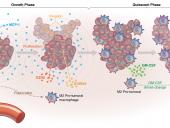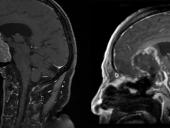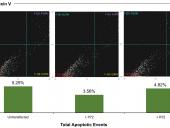Interactions with between immune cells and tumor cells have become a large focus in cancer research. A central question in this field revolves around how monocytes and macrophages differentiate into either an M1 subtype, which supresses cancer progression, or an M2 subtype, which enhances it.
News
Endoscopic transsphenoidal surgery offers excellent visualization for a giant pituitary adenoma removed at UCSF. Case study by Manish Aghi, MD, PhD.
Researchers at UCSF have recently discovered a polymorphism in the gene TP53 that influences the growth of non-functional pituitary adenomas (NFPAs). TP53 is known to be dysregulated in many human cancers, including brain cancers. But there have been few studies to date on how it may fit in to the development of pituitary tumors.
In a new reference guide, CCPD Medical Director Lewis Blevins Jr., MD, edits a collection of case illustrations that delve into the complexities of medical decision-making. Each case represents a unique and interesting aspect of the evaluation and management of patients with various pituitary disorders.



